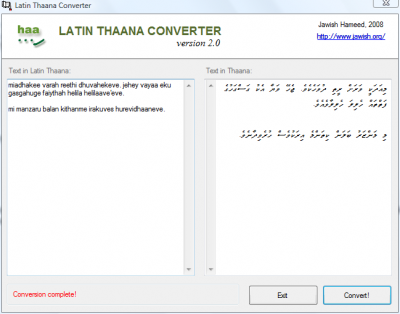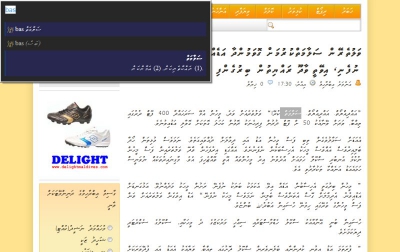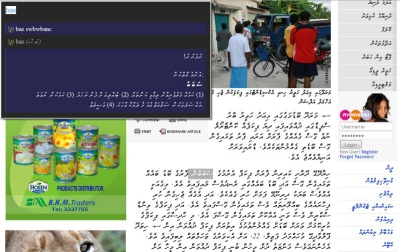Monday, November 10. 2008
Latin Thaana Converter 2.0
Latin Thaana Converter is a small, simple software for Microsoft Windows that performs transliteration on latinized (i.e. romanized) Thaana to convert it back into the Thaana script. This is a tool I originally released in 2003 under the name "Latin Dhivehi Converter"/"Lat2Dhiv". This new release carries a new name (which I think is a more technically correct name for what it does) and sports a few aesthetic changes but is functionally almost exactly the same as the original - it is basically a recompile of my old code within the .Net framework.
Automated transliteration of Latin Thaana is not an entirely easy task. Look up table based algorithms are simple to implement but are unable to correctly handle cases of sukun, present issues with most other fili and generally have a host of other problems as well. Latin Thaana Converter utilizes a finite state machine and its transliteration mappings are based on a more extensive scheme extracted from an analysis of a body of Latin Thaana-to-Thaana sample data. It maybe worth mentioning that the analysis had revealed that upto 4 characters were being used (and needed) for some Thaana transliterations. However, it must be said that the quality of transliteration from this is limited by the accuracy and diversity of the sample data I had used and hence is by no means perfect.
Since writing this program in 2003, I have experimented with probabilistic FSMs and also put machine learning techniques to the task with better results. I plan to write more extensively on Thaana transliteration algorithms at a later time...
2. Click "Convert".
3. The converted text appears in the "Text in Thaana" box.
- Latin Thaana Converter 2.0 Executable only (22.8KB, MS Windows)
Hope someone finds it useful
Automated transliteration of Latin Thaana is not an entirely easy task. Look up table based algorithms are simple to implement but are unable to correctly handle cases of sukun, present issues with most other fili and generally have a host of other problems as well. Latin Thaana Converter utilizes a finite state machine and its transliteration mappings are based on a more extensive scheme extracted from an analysis of a body of Latin Thaana-to-Thaana sample data. It maybe worth mentioning that the analysis had revealed that upto 4 characters were being used (and needed) for some Thaana transliterations. However, it must be said that the quality of transliteration from this is limited by the accuracy and diversity of the sample data I had used and hence is by no means perfect.
Since writing this program in 2003, I have experimented with probabilistic FSMs and also put machine learning techniques to the task with better results. I plan to write more extensively on Thaana transliteration algorithms at a later time...
Usage
1. Copy-paste or type the Latin Thaana text into the "Text in Latin Thaana" box.2. Click "Convert".
3. The converted text appears in the "Text in Thaana" box.
Download
- Latin Thaana Converter 2.0 Installer (126KB, MS Windows)- Latin Thaana Converter 2.0 Executable only (22.8KB, MS Windows)
Hope someone finds it useful






